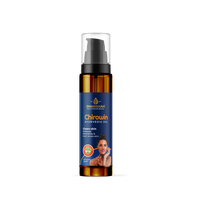Soothing Solutions: Discover the Best Ingredients for Calming Skin Redness
Dealing with skin redness can be frustrating and uncomfortable. Whether you're battling occasional flare-ups or chronic redness, finding the right ingredients to soothe your skin is crucial. In this comprehensive guide, we'll explore the best skin ingredients for redness, with a focus on natural and Ayurvedic solutions.
Understanding Skin Redness
Skin redness, also known as erythema, can occur for various reasons, including:
-
Inflammation
-
Allergic reactions
-
Sun exposure
-
Rosacea
-
Eczema
-
Sensitive skin
Before we dive into the ingredients that can help, it's important to understand that different types of redness may require different approaches. However, certain ingredients have proven effective in calming and soothing various forms of skin redness.
Natural Ingredients for Reducing Redness
Nature provides us with many powerful ingredients that can help reduce skin redness. Here are some of the most effective:
-
Aloe Vera: Known for its cooling and soothing properties, aloe vera can help calm irritated skin and reduce redness.
-
Chamomile: This gentle herb has anti-inflammatory properties that can help soothe redness and irritation.
-
Green Tea: Rich in antioxidants, green tea can help protect the skin and reduce inflammation.
-
Cucumber: The cooling effect of cucumber can help soothe redness and provide relief to irritated skin.
-
Calendula: This flower extract has been used for centuries to calm skin irritations and reduce redness.
Ayurvedic Approaches to Calm Skin
Ayurveda, the ancient Indian system of medicine, offers holistic approaches to skin health. At Dharishah Ayurveda, we believe in harnessing the power of natural ingredients to address skin concerns, including redness.
Some Ayurvedic ingredients known for their skin-soothing properties include:
-
Neem: Known for its anti-inflammatory and antibacterial properties
-
Turmeric: A powerful anti-inflammatory agent that can help reduce redness
-
Licorice Root: Helps soothe irritated skin and even out skin tone
-
Sandalwood: Known for its cooling and calming effects on the skin
The Power of Chirowin Oil
At Dharishah Ayurveda, we've combined the wisdom of Ayurveda with modern skincare science to create Chirowin Oil. This ayurvedic oil for skin is blend of natural ingredients is specifically formulated to address skin concerns, including redness.
Chirowin Oil contains:
-
Sesame Oil: Rich in antioxidants and has anti-inflammatory properties
-
Turmeric: Helps reduce inflammation and redness
-
Neem: Soothes irritated skin and has antibacterial properties
-
Licorice: Helps calm the skin and reduce redness
By combining these powerful ingredients, Chirowin Oil offers a natural solution for those dealing with skin redness. Regular use can help soothe irritated skin, reduce inflammation, and promote overall skin health.
Other Effective Ingredients
In addition to natural and Ayurvedic ingredients, there are several other components known to be effective in reducing skin redness:
-
Niacinamide: A form of vitamin B3 that can help strengthen the skin barrier and reduce redness.
-
Centella Asiatica: Also known as Gotu Kola, this herb can help soothe irritated skin and reduce redness.
-
Azelaic Acid: This ingredient can help reduce inflammation and redness, particularly in cases of rosacea.
-
Ceramides: These lipids help strengthen the skin barrier, which can help reduce sensitivity and redness.
-
Hyaluronic Acid: While not directly targeting redness, this ingredient helps hydrate the skin, which can help reduce irritation.
When choosing skincare products, look for these ingredients to help address skin redness.
Lifestyle Factors That Affect Skin Redness
While using the right ingredients is crucial, it's also important to consider lifestyle factors that can contribute to skin redness:
-
Sun Exposure: Always use sunscreen to protect your skin from harmful UV rays.
-
Diet: Certain foods can trigger skin redness. Pay attention to your diet and identify any potential triggers.
-
Stress: High stress levels can exacerbate skin issues. Practice stress-reduction techniques like meditation or yoga.
-
Skincare Routine: Avoid harsh scrubs or over-exfoliation, which can irritate the skin and cause redness.
-
Water Temperature: Use lukewarm water when washing your face, as hot water can increase redness.
When to See a Dermatologist
While many cases of skin redness can be managed with over-the-counter products and lifestyle changes, there are times when it's best to consult a dermatologist:
-
If your skin redness persists despite using soothing products
-
If you experience severe or painful redness
-
If you suspect you might have a condition like rosacea or eczema
-
If your skin redness is affecting your quality of life
A dermatologist can provide a proper diagnosis and recommend targeted treatments for your specific skin concerns.
Conclusion
Dealing with skin redness doesn't have to be a constant struggle. By incorporating the right ingredients into your skincare routine and making mindful lifestyle choices, you can help soothe your skin and reduce redness.
Remember, everyone's skin is unique, so what works for one person may not work for another. Be patient and give your skin time to respond to new products. If you're looking for a natural, Ayurvedic approach to managing skin redness, consider trying Chirowin Oil from Dharishah Ayurveda.
For more information on Ayurvedic skincare and natural remedies for various skin concerns, visit Dharishah Ayurveda. Our products are crafted with care, combining ancient wisdom with modern science to provide effective, natural solutions for your skin.
Have you tried any of these ingredients for skin redness? What has been your experience? Share your thoughts and experiences in the comments below. Your journey to calmer, less red skin starts today!













